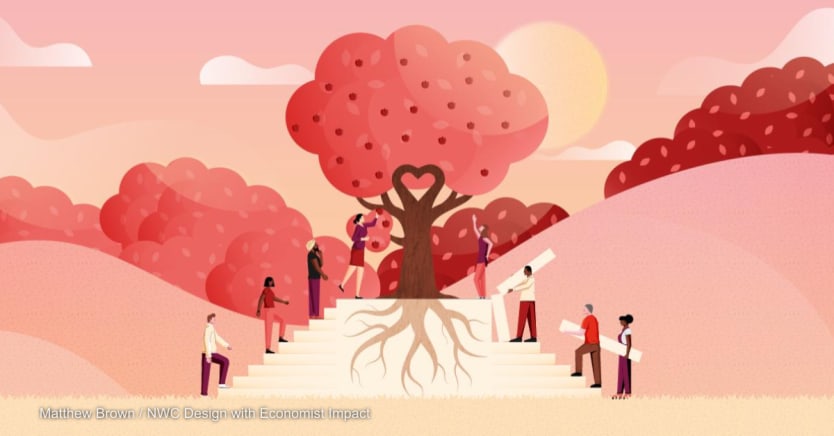
The global twin trends of rapid population aging and rising inequality present considerable opportunities for countries to pursue sustained economic and social development. In 2020 there were more people aged 60 years and older than children under five years of age. Paralleling this is the rise of inequality — exacerbated by the COVID-19 pandemic — that is continually impacting underserved population groups, causing enormous social and economic losses.
There is an urgent need for action from both low- and middle-income countries and high-income countries to tackle aging inequity, or the unfair differences experienced throughout the life course that culminate in greater disparities in older age, which are often based on gender, ethnicity, ability, geography, and other socio-economic factors.
To address knowledge gaps, catalyze conversation, and accelerate action, the fourth edition of AARP’s Aging Readiness and Competitiveness initiative, or ARC 4.0 — released in February 2023 with analysis conducted by Economist Impact — highlights solutions and leading practices to combat aging inequity. Although it focuses on LMICs, the ARC 4.0 report, which reveals key insights and calls to action for achieving equitable healthy aging, also has insights relevant to HICs, all of which are shared below.
Impeding inequalities is imperative to achieving economic security
Inequalities can have devastating impacts on a nation’s competitiveness. For example, empirical analysis by the Organisation for Economic Co-operation and Development indicates that increases in income inequality in 19 OECD countries between 1985 and 2005 led to a nearly five percentage point loss in cumulative gross domestic product growth from 1990-2010 in those countries.
Aging inequities can also hinder countries from tapping into the tremendous economic opportunities among growing older populations. In the United States, analysis reveals that inequalities in life expectancy — arising from racial disparities — could cost the country’s economy $1.6 trillion and over 10 million jobs in 2030 alone.
Governments can galvanize action if they demonstrate sustained commitment
Sustained commitment from governments is essential for cultivating the conditions to combat aging inequity. Governments play a central role in enhancing national legislation on protecting equal rights, building physical and institutional infrastructure — such as social protection, public health, and education systems — and implementing aging-related policies. The ARC 4.0 highlights a few cases in which sustained government commitment has enabled economies with relatively limited financial and institutional capacity to achieve equitable healthy aging.
One example is Bolivia. Despite having the lowest GDP per capita in South America, it has one of the highest coverage rates for pensions. Renta Dignidad, the country’s noncontributory pension, covers nearly 100% of the population aged 60 and over. In other countries, including Colombia, India, Thailand, and Vietnam, sustained political and financial commitments have also contributed to their remarkable progress on expanding pension and/or health care coverage over the past several decades.
When it comes to reducing aging inequities, think upstream
Adopting a life-course approach, requiring effective intervention in earlier life stages, is imperative to reduce aging inequity. For example, Mission Shakti in India works with about 600,000 community organizations to develop income-generating activities, provide financial services, and build professional skills for women, showing the potential to reduce gender inequities among future older populations. Meanwhile, Someone Somewhere, a social enterprise in Mexico, partners with artisans in Indigenous communities — and mostly older women — to promote traditional textiles while generating income for them.
Life-course interventions to improve health outcomes can mitigate health inequities among current and future older populations. In Ethiopia, the National Health Extension Program increases the provision of high-quality health care services in rural villages, and has improved maternal and child health, health knowledge, and community hygiene in those areas. In Malawi, the Kaundu Community-based Health Insurance program reduces out-of-pocket health expenditure in a rural region through a collaborative, community-operated, and community-owned insurance scheme.
Data deserts continue to drive policy inaction
While demographics and socioeconomic status have significant impacts on aging inequity, disaggregated data at the intersection of these factors are scarce. Globally, only 32% of countries have nationally representative, cross-sectional data — covering areas such as health, economic status, and family and social relations — on older populations that are available in the public domain.
From the archives:
Older generation at risk of being left behind in push for UHC
Could a lack of data mean older people aren't getting access to the care they need? A new report by HelpAge International and AARP claims the older generation is at risk of being left behind in the push toward universal health coverage.
This lack of data leaves partners with limited knowledge on how to best create avenues for equitable healthy aging. Nationally collected data need to be inclusive of the older population and consistently disaggregated by demographic and socio-economic factors. India’s first Longitudinal Ageing Study in 2017-19, a full-scale national survey of the health, economic and social determinants, and consequences of population aging, provides an encouraging example of such an effort.
Multisectoral approaches will advance equity in healthy aging
Collectively, we can build a prosperous society by achieving equity in healthy aging. Now is the time to act.
• International organizations and governments, in collaboration with civil society and academia, can invest in and lead efforts to collect data on older populations and healthy aging.
• The private sector can be inclusive of the needs of older adults when designing, developing, and providing products and services, as well as deliberately extending market outreach to meet the demands of underserved people.
• Employers can incorporate age into diversity, equity, and inclusion policies to support a multigenerational workforce and increase investment in employees’ health and well-being.
• Civil society can drive grassroots efforts to cultivate robust community-based networks of support, while individuals can contribute by combating discrimination based on age, gender, race, and ethnicity, among other forms.
Visit https://www.aarpinternational.org/ to learn more about AARP’s international work and to read the ARC 4.0 report, which was released on Feb. 9.









